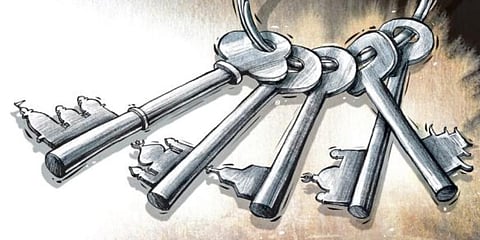

One of the unexplained conundrums of independent, ‘secular’ India is the unabashed involvement of the government in the management of Hindu places of worship all over the country.
This issue, which has been simmering for decades but pushed under the carpet by the Nehruvians and Marxists, has now come to the fore because of the pragmatic initiative of Karnataka Chief Minister Basavaraj Bommai to liberate Hindu temples in his state from government control.
The Congress party, which has been the fountainhead of a dubious brand of secularism in the country since the days of Jawaharlal Nehru, had ensured government control over Hindu temples across the nation through various laws and regulations that fly against the basic secular tenets of the Constitution. In other words, the Nehru government continued the British policy of controlling temples and dipping into their funds.
The Preamble to the Constitution, when it first came into force in 1950, defined India as a “sovereign democratic republic”. Later, during the Emergency, the Congress party added the words “socialist” and “secular” to the Preamble.
Apart from the Preamble, the assertion of the secular ideal can be seen in other articles of the Constitution, notably including Articles 25 and 26.
Article 25 guarantees freedom of conscience and free profession, practice and propagation of religion; Article 26 guarantees the freedom to manage religious affairs. It declares that every denomination or any section thereof shall have the right to establish and maintain institutions for religious and charitable purposes; to manage its own affairs in matters of religion; and to own and acquire property and administer it.
Muslims, Christians, Sikhs and other religious denominations utilise these constitutional guarantees to the fullest and manage their institutions. These institutions are out of bounds for the government.
However, since Independence, the government has been intruding into the affairs of Hindu religious institutions in what constitutes gross contempt for this constitutional provision and for the sentiments of 100 crore Hindus in the country.
Such is the callous indifference of the Congress party to the fundamental principles in the Constitution that it has now begun advancing several bizarre arguments against Chief Minister Bommai’s plan to liberate the temples.
Some of these arguments, including those of D K Shivakumar, President of the Karnataka Pradesh Congress Committee (KPCC), are rather strange.
In his recent tweets in Kannada, Shivakumar says that the exchequer gets a lot of funds from Hindu temples in southern states. As a result of Covid, the state’s treasury is getting emptied out. At a time like this, to liberate temples from state control and hand them over to private individuals is like rubbing salt into the wound.
Terming the Karnataka government’s move a “historic blunder”, Shivakumar contends that the temples are the “wealth of the government” because crores of rupees pour in from them into the treasury.
According to media reports, Karnataka has close to 35,000 temples and they are placed in three categories depending on the annual revenue they generate. The most prominent temples have generated around `1,400 crore in the last couple of years.
The arguments of Shivakumar defy constitutional logic. He sees the offerings of Hindu devotees in temples as revenue, just like excise, sales tax and so on.
Sadly, the Hindus have allowed this to go on for so long that there are politicians in the country who believe that it is the right of the government to treat these places of worship as milch cows.
The statements of the KPCC president need to be challenged. It is indeed amazing to hear his argument that if the government disengages itself from the business of running temples, the state’s revenues will drop! Would he dare ask the mosques, churches and gurdwaras in the state to remit all the offerings of devotees to the government treasury, since Covid continues to haunt us? How is it the responsibility of just Hindus to buttress the government’s coffers during times of financial distress?
More importantly, since the Congress introduced the word ‘secular’ into the Preamble, can the KPCC president explain what this term means to him? Is not the equal treatment of all religions the central pillar of secularism? Further, what about Article 26? Is it the Congress party’s contention that Hindus are barred from exercising the right to establish and maintain their religious places and manage the affairs of their religion?
One of the arguments advanced by pseudo-secularists is that if temples are managed by Hindu individuals, there will be chaos and mismanagement. Are Muslim and Christian religious places and institutions managed well? If they are not, will the government step in?
Bommai’s move comes in the wake of growing sentiments against the government control of Hindu temples and the views of key public opinion influencers like Sadhguru Jaggi Vasudev. He says there are 44,000 temples with over half a million acres of land under the management of the Tamil Nadu government. However, the revenue from these temples is a paltry `128 crore. In comparison, the Sadhguru says, the Shiromani Gurdwara Parbandhak Committee manages 85 gurdwaras, but its budget is over `1,000 crore. This statistic is indeed an eye-opener.
One must congratulate the Karnataka chief minister for having raised the red flag. He must live up to his promise, devise a system to disengage the government from temple control and set an example that all other states can follow.
A Surya Prakash
Former chairman of Prasar Bharati and Scholar, Democracy Studies
(suryamedia@gmail.com)